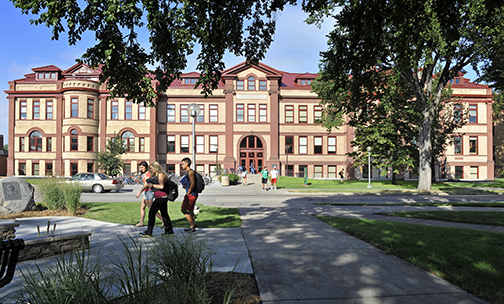
Journalism
This is an archived copy of the 2019-20 catalog. To access the most recent version of the catalog, please visit https://catalog.ndsu.edu.
Journalism is one of four majors offered by the Department of Communication. Students are trained in both print and broadcast journalism. The program has a strong emphasis on cross-platform reporting and multi-media storytelling.
The Program
Students interested in pursuing an undergraduate degree offered by the Department of Communication must first complete all courses associated with the Pre-Communication requirements. Once all Pre-Communication courses and requirements are met, students submit the transition form, available on the department's website, to their advisor. After verification of accuracy, the student is accepted into the professional program and can continue pursuing a degree in the Department of Communication.
Admission to the Major
Students must complete 19 credits of Pre-Communication courses with a minimum 3.0 GPA to become a journalism major. The courses are COMM 110, COMM 112, COMM 114, COMM 189, COMM 212, COMM 220, and ENGL 120.
Journalism Major
Students majoring in journalism may earn a Bachelor of Science degree (includes an approved minor) or a Bachelor of Arts degree (includes a modern language proficiency).
Career Opportunities
Coursework in the journalism major prepares students for careers in news reporting, media writing, broadcast writing, and broadcast production. The courses emphasize written and oral communication skills and prepare students to communicate in meaningful and effective ways with a variety of audiences.
Journalism Minor
Many other majors offered at North Dakota State University can be greatly enhanced by a journalism minor. The 21-credit minor includes a nine-credit core and twelve credits of professional specialization electives.
Internship Requirement
Internships offer practical experience for journalism students. After securing an internship, students must gain approval from the departmental internship coordinator, have an on-site evaluation, and report on the internship experience. Three credits (120 hours) of this field experience are required for the major, and many students complete more than one internship. Students have interned with a variety of media companies in the Fargo-Moorhead area and beyond. Internships often lead to jobs.
Scholarships
The Department of Communication awards a number of scholarships to students who excel in academics and who have demonstrated career potential. Applications are due by March 1. Visit the department website for information.
Extra-Curricular Activities
Students majoring in journalism are encouraged to gain additional experience by working with the Bison Information Network (television), KNDS-96.9 (radio), or The Spectrum (print). NDSU has two honoraries for top students majoring in a degree program offered by the Department of Communication. Pi Kappa Delta is a national honor fraternity for students involved in human communication activities. Lambda Pi Eta is a national honorary for communication majors with high academic achievement.
High School Preparation
A well-rounded high school education with experiences in high school music, forensics, theater, newspaper, or yearbook serves as good preparation for a major in journalism. Students with interests in science and art, business and service, and publicity and promotion will find a major in this department to be a good fit.
The Faculty
Faculty members in the Department of Communication are dedicated teachers, scholars, and practitioners who are committed to providing high-quality courses, hands-on learning experiences, and opportunities for undergraduate research. We encourage students who want to learn more about our faculty to reach out via email or schedule an appointment via Navigate.
Plan of Study
Please note this is a sample plan of study and not an official curriculum. Actual student schedules for each semester will vary depending on start year, education goals, applicable transfer credit, and course availability. Students are encouraged to work with their academic advisor on a regular basis to review degree progress and customize an individual plan of study.
| First Year | |||
|---|---|---|---|
| Fall | Credits | Spring | Credits |
| COMM 112 | 3 | COMM 110 | 3 |
| COMM 114 | 3 | COMM 200 | 3 |
| COMM 189 | 1 | ENGL 120 | 3 |
| ENGL 110 (or placement) | 4 | Humanities/Arts GE | 3 |
| Quantitative Reasoning GE | 3 | Science/Technology GE | 3 |
| Wellness GE | 2 | Science/Technology Lab GE | 1 |
| 16 | 16 | ||
| Second Year | |||
| Fall | Credits | Spring | Credits |
| COMM 212 | 3 | COMM 320 | 3 |
| COMM 220 | 3 | Major Elective | 3 |
| Minor or Language Coursework | 3 | Minor or Language Coursework | 3 |
| Global Perspectives GE | 3 | Humanities/Arts GE | 3 |
| Science/Technology GE | 3 | Science/Technology GE | 3 |
| 15 | 15 | ||
| Third Year | |||
| Fall | Credits | Spring | Credits |
| COMM 310 | 3 | Major Elective | 3 |
| COMM 496 | 3 | Major Elective | 3 |
| Major Elective | 3 | Minor or Language Coursework | 3 |
| Minor or Language Coursework | 3 | Minor or Language Coursework | 3 |
| Upper Division Writing | 3 | AHSS Requirement | 3 |
| 15 | 15 | ||
| Fourth Year | |||
| Fall | Credits | Spring | Credits |
| COMM 431 | 3 | COMM 465 | 3 |
| Major Elective | 3 | Major Elective | 3 |
| Minor or Language Coursework | 3 | Minor or Language Coursework | 3 |
| AHSS Requirement | 3 | Additional Coursework May Be Required to Reach 120 Credits | 4 |
| Additional Coursework or Internship | 3 | ||
| 15 | 13 | ||
| Total Credits: 120 | |||
